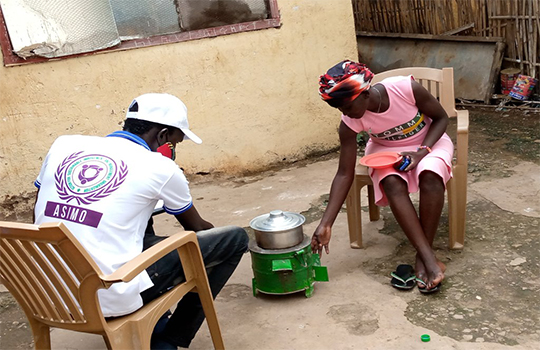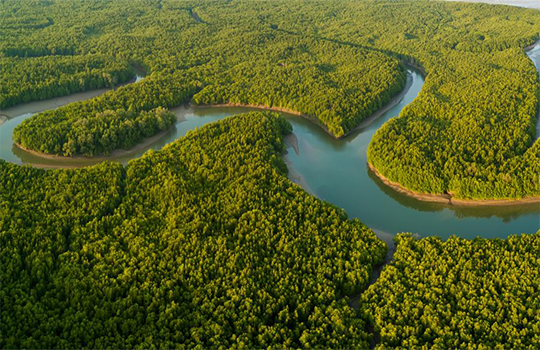Climate change Mitigation & Adaptation.
South Sudan is among the five most climate-vulnerable countries in the world. Since the mid-1970s, rainfall has decreased by 10-20%.
We come from a history of recurrent and often protracted climate risk and conflict in South Sudan, and the country has not fared well on matters related to biodiversity, ecosystems and climate action. The country is very susceptible to the effects of climate change and the accompanying socio-economic losses and damages, owing to its population's reliance on climate-sensitive natural resources for example, a high deforestation and forest degradation rate.
Climate risks have wreaked havoc on the country's many industries throughout the years. Droughts and floods are the most often occurring climatic hazards, both of which result in economic losses for the nation
The country is starting on a road toward sustainable development and wishes to use cutting-edge clean technology in order to achieve a low-carbon, climate-resilient development result. By 2040, South Sudan aspires to become a newly industrialised, middle-income nation and pledges to continue to invest domestically and internationally in order to adapt to climate change and maximise its mitigation potential.
South Sudan's greenhouse gas (GHG) emissions in 2020 saw a significant 13.97% increase compared to 2019, reaching a total of 56,051.36. The previous year, in 2019, South Sudan's GHG emissions experienced a notable decline of 12.8% with a recorded value of 49,180.53. Furthermore, in 2018, South Sudan observed a 9.86% increase in GHG emissions, totalling 56,397.92
To address this climate crisis, ASIMO will continue collaborating with the South Sudan governments (especially the key line Ministries), the private sector, foundations, international organizations, academia, NGOs, & UN agencies by promoting positive, solutions-driven approaches to combat climate change, to highlight transformational climate action and to improve public understanding of the issue. We are, for example, part of a regional consortium partners working together as an attempt to address the serious threats posed by the climate crises, biodiversity loss and poor energy solutions in Africa Countries.
ASIMO's climate change adaptation work happens across six thematic areas to support vulnerable communities in building resilience to climate change mitigation and adaptation in South Sudan.
South Sudan is vulnerable to climate change and associated socio-economic losses and damages due to the dependence of its population on climate-sensitive natural resources for their livelihoods. Furthermore, there is currently limited institutional and technical capacity, appropriate technologies and financial resources to support the implementation of interventions for adaptation and mitigation to climate change.
ASIMO will continue to put greater emphasis on matters related to building agricultural resilience for food and nutrition security as a step towards mitigating further crises and ensuring sustainability of programmes that we implement across the country! Indeed, we had been increasingly integrating these thematic aspects into all our programmes as part of best-practice and in line with South Sudan government NDC and NAP, NDC (Nationally Determined NAP (National Adaptation Plan) à see attached;
Contribution) 1. https://www.undp.org/south-sudan/publications/south-sudans-second-nationally-determined-contribution-climate-promise
2. LTS (Long-term. strategies) https://www.climatewatchdata.org/countries/SSD?end_year=2020 & start_year=1990
Women climate entrepreneurs & SMEs in South Sudan are facing substantial challenges in accessing finance through financial institutions locally. The MSEs lack the capacity and tools to build an investment pipeline to finance their climate resilience business activities in these fields. To overcome these market barriers, ASIMO works to support these SMEs and women entrepreneurs by building their capacities on the production and marketing of a clean cooking stoves as well as linking them with financial institutions to access their start-up capital in form of loans or revolving funds. We shall continue to provide clean energy solutions in urban and rural areas to ensure that rural communities improve resilience with access to clean and reliable energy in South Sudan. Indeed, in our latest initiative, we are also approaching our partners and international Donors for additional financial support to expand equitable solar energy access among marginalized communities in South Sudan.

Efficient Engergy stoves project by ASIMO.
In this sector, ASIMO will continue to embark on promoting sustainable, climate smart agriculture and livestock production and management through diverse funding mechanisms and approaches. The organization will prioritise the enhancement of climate resilience in the agricultural sector (crop production, livestock, fisheries) through the promotion of climate-smart agriculture, livestock improvement, enhancement of fisheries productivity and soil erosion control.
We shall achieve this through a broad ally of actions like building upon traditional knowledge and supporting community- based adaptation strategies in areas of our operations mainly in Upper Nile, Western Bhar el Ghazal, Central Equatoria, Warrap, Greater Pibor, Aweil and Jonglei States with the intension to increase sustainable agricultural productivity, enhance household resilience, and reduce greenhouse gas emissions, contributing to a more sustainable and resilient agricultural systems that promotes poverty reduction, create jobs, biodiversity conservation and environmental sustainability, and overall sustainable development.
ASIMO’s support to small holder farmers & MSEs will include the capacity building on climate resilience agriculture value chains both on the production, aggregation, processing, distribution, consumption, marketing and disposal of products that originate from agriculture, forestry or fisheries, and the environments in which they are embedded. We have intensified our strategic building function and are also seeking additional funding and partnership from donors.
The country’s climate information services, early warning systems and disaster risk reduction mechanisms will be expanded and upgraded in a number of ways to enhance: disaster risk knowledge; detection, monitoring, analysis and forecasting of hazards and possible consequences; warning dissemination and communication; and preparedness and response capabilities. ASIMO will extend the support by implementing the digital information system that will help farmers know how to deal with pests and diseases and optimum fertilizer / pesticide dosages, as well as climate information. It will be extended to pastoralists, small holder farmers and cattle herders, enabling them to protect themselves against financial losses caused by climate-related events and enhancing their stability and resilience for managing natural resources. To support decision-making for climate change adaptation, ASIMO will continue advocating for policy makers and various institutions to implement actions to assemble, analyse, predict and disseminate climate information through improved climate monitoring and data management systems as outlined in NAP. We have also embarked on partnership building around this area and have established working relations with other national, regional and global agencies.
The Government of South Sudan, which has already announced its intention to integrate a gender perspective into national-level climate change policies and strategies, and is targeting a 35% representation of women in decision-making related to climate change, according to its, https://www.undp.org/south-sudan/publications/south-sudans-second-nationally-determined-contribution-climate-promise, and according to social science action reported that, women are still exposed to climate change disasters, have fewer resilience assets, rely more on natural resources, have high rate of illiteracy, low skills and low access to professional employment, and are therefore more vulnerable to climate change calamities than men. This exclusion widens the gaps in conflict and gender-responsive programming and decision-making spaces as regards land, agriculture, and climate action. To address this gap, ASIMO shall continue to advocate against the main threats of gender inequality in climate action by building the capacity of Women-led CSOs to raise their voices in climate action as equal partners, recognizing their rights to participate in decision-making processes in climate change to productively use their knowledge, perspectives, and experience and not as passive victims.
ASIMO’s intervention always focuses on sustainable forest and land management programming by combating land degradation and deforestation. Our work to enhance the Food Systems, Land Use, and Restoration offers the opportunity for an integrated approach of sustainable land management through awareness, advocacy and capacity building of the communities to increase the prospects for food security production to smallholders’ farmers and communities that are dependent on farming for their livelihoods. Our intervention will continue to avoid further degradation, desertification, and deforestation of land and ecosystems in drylands through the sustainable management of production landscapes. We also fostering strategic partnerships with diverse agencies addressing and or supporting these causes, for example, The Mohamed bin Zayed Species Conservation Fund, The Convention on Biological Diversity (CBD), and so on.

